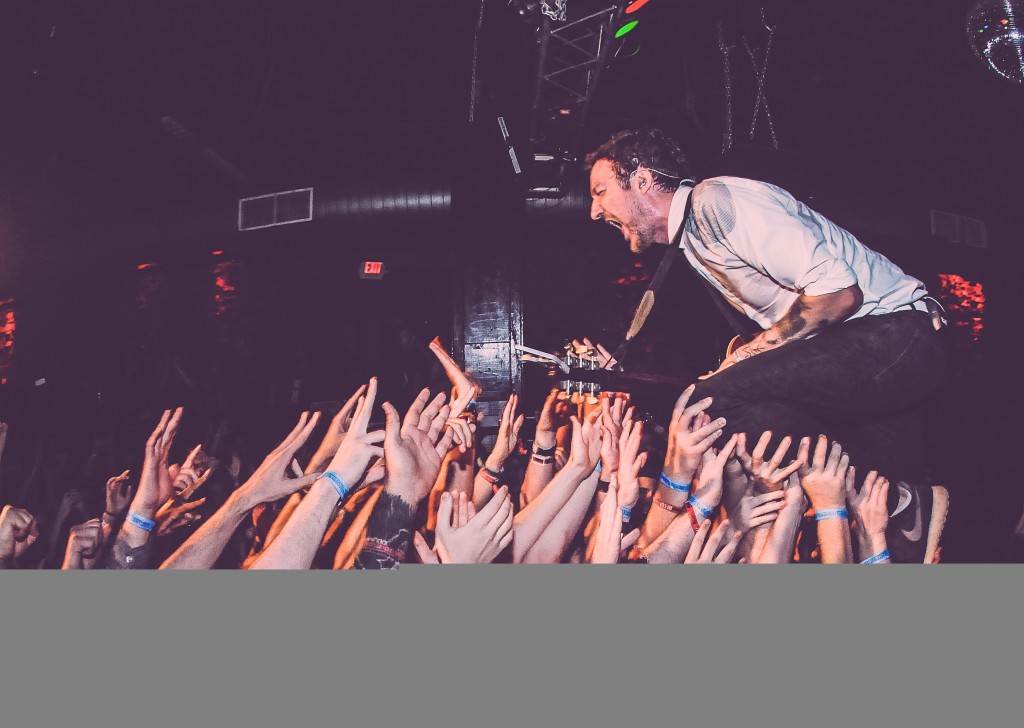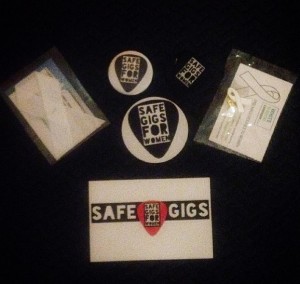Tracey Wise, London, UK, SSH Blog Correspondent

After the unfortunate harassment incident that led me to create Safe Gigs for Women, I was acutely aware that the band I had gone to see, Manic Street Preachers, would not have condoned such behaviour, so why did someone at one of their shows think this was appropriate?
With its focus on music, it makes perfect sense that Safe Gigs for Women should seek to work with bands and artists to get them on side. They have a ready-made platform to reach out to people, so having their support is essential.
In approaching artists to gain their support, Frank Turner seemed a natural choice. Known for his beliefs in libertarianism, egalitarianism and a passion for music that more than rivals my own, he very kindly offered his support and agreed to meet me to discuss this during his recent UK tour, at Nottingham’s Rock City. I also met his supporting artists Will Varley and Lorna Thomas from Skinny Lister. It seems like an odd time to be writing this blog, after the events in Paris, but these interviews were planned before the terrorist attack which left 89 people who had been at an Eagles of Death Metal gig, dead.
Safety at gigs seems a much wider notion right now. But in discussing whether Frank Turner believes artists have a responsibility towards the safety of their fans, his stance is that of having “a duty of care” towards those that have paid to see him. Indeed, Turner has been known to stop shows to confront unwanted behaviour by members of the crowd, and further states “of course, I don’t want people getting hurt at my shows”. Whilst he may be comfortable, at times to intervene, he is also thankful for the role of security at shows, proving, again, that achieving safer gigs at women will take a multi-faceted response.
As I acknowledged in my first blog for Stop Street Harassment, there have been notable cases of female artists being groped at shows. When I raised this with Turner, Varley and Thomas, Varley highlighted that, unfortunately, that there is a small “proportion of arseholes” at gigs. Thomas admitted to being recently groped whilst crowd surfing at a Skinny Lister show. In discussing this with Turner he acknowledges that he believes he was “naive”, having never realised that this happens, further stating his reaction to be “Really? Who would do that?” and being certain that no men he knows would ever act in such a way. And this is the crux of the matter – if Turner, my friends and myself are sure that the people we know are not behaving like this, then it is a small group of people making it difficult for women, emphasising the need for campaigns like this, and bands and artists to engage with gig goers to get them to think about their behaviour.
Since starting this project, some commentators have put it to me that women-only shows are the answer. I do not agree, for numerous reasons. I am not an economist, or schooled in the music business, but how would the cost of this impact on smaller, independent labels, venues and acts? As a consumer of music in my own right, as covered in my last blog, surely I have the right to attend the events I choose, with whomever I want to?
Furthermore, and most importantly, it automatically assumes the worst of men. As most of my friends are male, and as the aunt to a 5-year-old boy, this offends me as much as it upsets me. Discussing the notion of women only gigs, Frank Turner states he finds this “defeatist” and “sexist, it says men are beyond any redemption”. This was also shared by Will, stating that “segregation is not the answer”, and Lorna emphasising that what is really needed is a “mind shift”. Considering there are so many men out there doing good to support this project, such as the White Ribbon Project, the artists who supported our first fundraiser, including Jukebox Monkey and Peter Von Toy, and Frank Turner himself, women only gigs feels like a massive step backwards.
Recent world events have shown just how crucial music is in the world around us. And that is why the support of artists like Will Varley, Skinny Lister and Frank Turner is so important. Because, as Turner puts it, “what better forum is there to try and teach people not to be pricks?”
Born and raised in London, Tracey is a graduate of City University. She has spent the best part of her life at gigs and festivals and obsessing about music and created the “Safe Gigs for Women” project.

